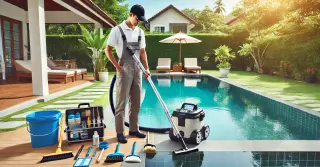Residential Pool Maintenance Bar Harbor ME

Effective residential pool upkeep requires routine cleaning and debris control. Ensuring your pool is free from dirt, leaves, and other debris is essential for both aesthetics and health.
- Surface Skimming and Pool Vacuuming: Routine skimming and vacuuming are important activities to keep your pool clean. Utilize a pool skimmer to clear floating debris like leaves and insects, and vacuum the pool floor to remove dirt and sediment. This keeps the water clear and inhibits algae and bacteria.
- Scrubbing Pool Surfaces and Tiles: Make sure to clean the pool walls and tiles frequently. Brushing the walls and cleaning tiles stops algae, calcium, and residue accumulation. Use a brush suitable for your pool’s surface, be it plaster, fiberglass, or vinyl, to avoid damage. Consistent cleaning keeps your pool pristine and extends its life.
Ensuring Proper Water ChemistryBalancing the water chemistry is vital for swimmer safety and comfort. Proper chemical levels prevent algae growth, bacteria, and other contaminants, while also protecting your pool's structure and equipment.
- Consistent Chemical Testing and Balancing: Regularly test your pool water to monitor chemical levels, including pH, chlorine, alkalinity, and calcium hardness. Use a reliable pool test kit to get accurate readings. Make adjustments as required to keep the water balanced. Balanced water prevents corrosion, scaling, and cloudiness, providing a safe and enjoyable swim.
- Safe Pool Chemical Handling: When handling pool chemicals, always follow manufacturer guidelines and use appropriate safety gear, such as gloves and safety glasses. Add chemicals in the correct order, and avoid mixing them directly, as this can lead to dangerous reactions. Store chemicals in a cool, dry place, out of children’s and pets' reach. Using pool chemicals safely protects everyone and keeps your pool water pristine.
Inspecting and Maintaining EquipmentRegular inspection and maintenance of pool equipment are crucial for efficient pool operation. This includes pumps, filters, heaters, and chlorinators, which all play key roles in keeping your pool clean and functional.
- Checking and Cleaning the Pool Pump and Filter: Frequently inspect your pool pump and filter to ensure they are functioning correctly. Clean or replace filter cartridges as required to keep filtration effective. A well-functioning pump and filter keep water clear and free of impurities, reducing the burden on chemical treatments.
- Maintaining Heaters and Chlorinators: Make sure your pool heater and chlorinator are operating efficiently. Look for signs of wear and tear, such as leaks, rust, or faulty parts. Routine maintenance and prompt repairs can prevent expensive breakdowns and increase the lifespan of your equipment. An efficient heater guarantees pleasant water temperatures, while a working chlorinator keeps the water clean.
Residential pool maintenance involves regular cleaning, balanced water chemistry, and equipment maintenance. By adhering to these practices, you can enjoy a safe, clean, and inviting pool throughout the swimming season.




